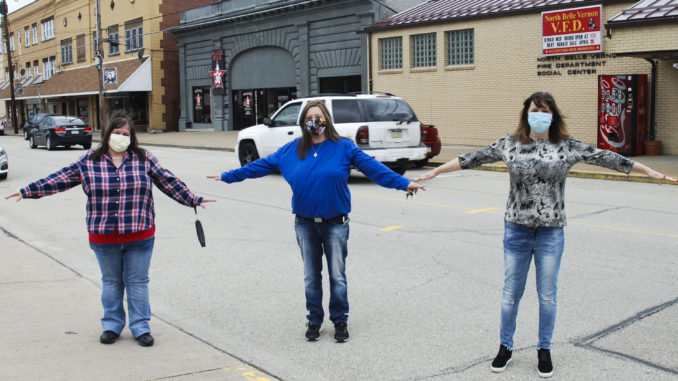
By KRISTIE LINDEN
For some business owners in North Belle Vernon, the idea of being branded non-essential is one thing, but being told they can’t operate creatively to survive the pandemic is too much.
At 10 a.m. today, business owners on Broad Avenue are asked to make themselves visible by turning on the lights at their storefronts, planting flowers, doing curbside pickups or making some other gesture. They hope to get car horns blowing for support and make a statement of solidarity with each other.
Kathy Heinz, who owns Hey Juicy, The Grey Area and Ultimate Nutrition on Broad Avenue, said she was allowing customers to order items online and was shipping the products. She went in to Hey Juicy twice a week to prepare shipments.
On Tuesday, she decided to let three customers get their orders in person through a curbside pick-up option — similar to what restaurants and some other businesses like JOANN Fabric and Craft Stores.
A North Belle Vernon police officer stopped by the store and told Heinz she couldn’t do curbside pickup because her business isn’t classified as essential. She can ship products, but can’t have customers meet her in person to pick up their orders.
Heinz said the officer told her that someone reported her business to the state. He also saw one of her employees handing orders to a customer in the parking lot, she said. She was given a warning, but Heinz said she will be fined if she is caught again.
Heinz plans to continue to ship products because she has to keep the bills paid.
She doesn’t understand why craft stores and Dick’s Sporting Goods, for example, can offer curbside pickup but she has to ship products through the mail to customers who live just a few blocks from her store. Heinz said it takes days for customers to get their orders because the mail is so backed up due to the pandemic.
“I saw all of these other stores doing curbside pickup so I thought why can’t I then? They’re no better than I am, so why can’t I do it,” Heinz said. “I did it one time and I got caught.”
Heinz said she isn’t opening the store to customers, no one was in the store and she doesn’t want them there yet. She isn’t interested in putting customers or employees in danger, but she wants to keep her bills paid.
Heinz also points out that some businesses that sell the same kind of items Hey Juicy offers, various vaping products, are open.
“I’m losing customers every single day because who wants to wait for shipping and who wants to pay the prices to ship,” Heinz said. “I’m going to sink.”
Diann Donaldson, who owns Jazzy Boutique, has been selling items online and through social media. She has offered non-contact delivery within 10 miles, shipping and curbside pickup.
“I’m no different than JOANN Fabrics; we’re no different than anybody else,” Donaldson said. “Why are we being singled out? We would have more sanitization going on than any of these big box stores. We would have masks for our customers, we would have hand wipes and we would wipe down after every customer. Jazzy has maybe 10 customers a day, at best, not 1,000 a day.”
Donaldson said she’s selling things at cost to pay the electric bill. There are stores she knows of that are closing for good because they didn’t qualify for any of the grants or loans available.
“Our beef is, why can’t we do curbside? Why can’t we? Why can’t we open with really strict CDC guidelines? One customer, one employee — I’m happy, I’m good with that,” Donaldson said. “We’re ready to roll and we can do it so much more safely than these big box stores.”
She’s already made arrangements with a company that will sanitize her store every night once she’s permitted to reopen for customers.
Heinz, who lost her husband five months ago and is now a single mother, feels like being restricted from offering curbside pickup limits her ability to feed her family and will not stop shipping products from her store to get through the pandemic.
“I guess you’ll have to come arrest me,” Heinz said.
Donaldson feels for her employees, too, because many of them work so few hours they don’t qualify for unemployment. They’re young and in school, but they still have financial responsibilities.
“We don’t know what Gov. (Tom) Wolf is going to say (Friday). Is he going to hurt us more?” Donaldson asked.
Heinz also expressed frustration at the idea of being lumped in with Allegheny County, which is far from Broad Avenue but could impact the date the southwest region of the state is able to reopen due to the higher rate of the virus in that county.
Joyce Ernst, who opened Art on the Avenue in January, didn’t qualify for loans or grants because she hasn’t been open long enough. She saw some of her fellow business owners were told they can’t even be inside their businesses while the stay-at-home order is in place and had to speak out on social media.
“Why are all of these other businesses allowed to be open and we’re not?” Ernst asked.
She posted the question on a Monongahela/New Eagle Facebook group page to see if business owners in those towns were also facing warnings from law enforcement. Some owners said they’d heard rumors that people were walking along Main Street in Monongahela with a notebook, writing down information about businesses whose owners were inside doing things.
“We just want to know what our rights are,” Ernst said. “To say that we’re not allowed in our stores to try to survive, that’s just not right.”
Art on the Avenue offers arts and crafts for children, painting parties and similar services. Initially, the store tried to keep area kids interested and considered making kits for them to make art at home. But after some thought, Ernst reconsidered.
“But, why aren’t we allowed to go inside our stores? Are you going to pay my bills?” Ernst asked. “We’re going to try to think of ways to make money. What law is it that says we can’t try to make some money to survive? What am I supposed to do?”
Ernst wanted to gauge what was going on in other Mon Valley communities and their business districts to see if things were the same throughout.
“We need to speak for every business in this Mon Valley,” Donaldson said.
She’s heard from fellow business owners who haven’t been able to get through to unemployment and have had to sign up for food stamps.
Donaldson said the American dream of owning a business has been reduced to needing food stamps to survive.


